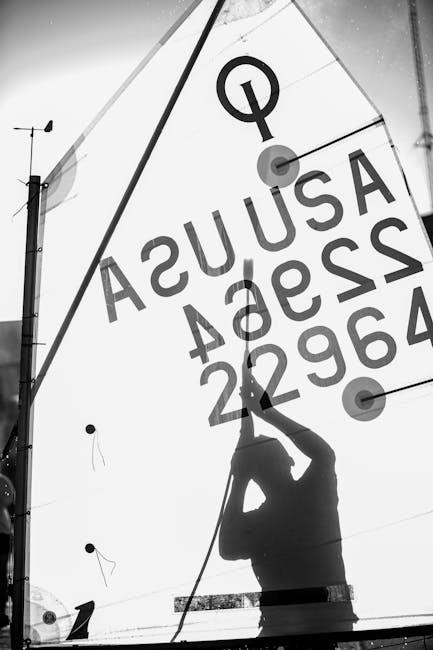Billy Budd, Sailor by Herman Melville is a thought-provoking novella exploring innocence, morality, and authority. Set during the Napoleonic Wars, it follows young Billy Budd’s tragic journey aboard a British warship, delving into themes of justice, power, and human nature. Available in PDF and other formats, this classic tale remains a timeless exploration of ethical dilemmas and societal structures.
Background Information on Herman Melville
Herman Melville (1819–1891) was a renowned American novelist, short story writer, and poet, best known for his epic novel Moby-Dick. Born in New York City, Melville grew up in a family that valued literature and the sea. His early life included a stint as a sailor on whaling ships, experiences that deeply influenced his writing. Melville’s works often explored themes of human nature, morality, and the complexities of life. Billy Budd, Sailor, written in the final years of his life, was published posthumously in 1924. The manuscript, discovered by scholar Raymond M. Weaver, remains a testament to Melville’s profound insight into ethical dilemmas and societal structures.
Publication History of Billy Budd, Sailor
Billy Budd, Sailor was written by Herman Melville in the late 19th century but remained unpublished during his lifetime. The manuscript was discovered in 1918 by scholar Raymond M. Weaver, who found it among the belongings of Melville’s granddaughter. The novella was first published posthumously in 1924. Initially, it gained limited recognition but later became a significant work in Melville’s canon. The original manuscript was heavily revised, reflecting Melville’s evolving ideas. Today, Billy Budd, Sailor is widely available in various formats, including PDF, ePUB, and MOBI, making it accessible to readers worldwide. Its publication history highlights the challenges of interpreting Melville’s unfinished work, adding layers of intrigue to its literary legacy.
Structure and Composition of the Novella
Billy Budd, Sailor is structured as a nautical novella, blending narrative with philosophical reflections. The story unfolds aboard a British warship during the Napoleonic Wars, focusing on Billy Budd’s moral conflict with John Claggart. Melville’s manuscript was heavily revised, leaving it unfinished at his death. The novella’s composition reflects its complex evolution, with themes of innocence, guilt, and authority woven throughout. Its non-linear narrative and ambiguous ending add depth, inviting interpretation. As part of a collection that includes works like Bartleby and Benito Cereno, Billy Budd, Sailor showcases Melville’s exploration of human nature. The manuscript’s unfinished state has led to varying interpretations, enriching its literary significance. Its availability in PDF and other formats ensures its accessibility for modern readers.
Historical Context of the Novel
Billy Budd, Sailor is set during the Napoleonic Wars, exploring British naval life and the press gang system. Written in the late 19th century, it reflects Melville’s insights into authority and morality, offering a historical lens on maritime life and societal hierarchies of the era.
Setting: British Naval Life During the Napoleonic Wars
The novella is set aboard a British warship during the Napoleonic Wars, a time of heightened naval activity and strict discipline. The story unfolds on the HMS Bellipotent, where the rigid hierarchy of naval life is central to the narrative. The press gang system, still in use until 1815, plays a significant role in Billy Budd’s impressment into service. Life on board is marked by harsh conditions, constant vigilance, and the ever-present threat of mutiny. The confined, authoritarian environment amplifies the moral and ethical conflicts between characters, particularly the clash between Billy’s innocence and Claggart’s malice. This setting serves as a microcosm of societal structures, exploring themes of power, justice, and human nature within a rigid military framework.
The Press Gang System in the 19th Century
The press gang system was a controversial practice in 19th-century Britain, where men were forcibly conscripted into naval service. This system, in use until 1815, targeted unemployed sailors, criminals, and even innocent civilians like Billy Budd. The gangs operated with little oversight, often disregarding legal protections. Their actions were justified by the urgent need for manpower during the Napoleonic Wars. The system highlighted the tension between national security and individual rights, creating widespread resentment. In Billy Budd, Sailor, Melville critiques this practice, illustrating its impact on vulnerable individuals and its role in the broader moral conflicts aboard the HMS Bellipotent. The press gang’s arbitrary power reflects the novella’s themes of authority and injustice.

Main Characters in Billy Budd, Sailor
Billy Budd, the innocent young sailor, John Claggart, the enigmatic master-at-arms, and Captain Vere, the morally conflicted authority, drive the novella’s exploration of innocence, evil, and justice.
Billy Budd: The Innocent Young Sailor
Billy Budd is the central character of the novella, portrayed as an innocent and kind-hearted young sailor. His inherent goodness and naivety make him a symbol of moral purity. Pressed into service aboard a British warship during the Napoleonic Wars, Billy’s innocence is tested by the harsh realities of naval life. Despite his simplicity, he earns the admiration of his crewmates, who are drawn to his genuine nature. However, his inability to comprehend evil leads to tragic consequences, as he becomes entangled in a conflict with the enigmatic Master-at-Arms, John Claggart. Billy’s story serves as a poignant exploration of innocence in a world dominated by power and moral ambiguity, making him one of Melville’s most enduring characters.
John Claggart: The Enigmatic Master-at-Arms
John Claggart is the enigmatic Master-at-Arms aboard the British warship, serving as a symbol of authority and deception. His complex character is shrouded in mystery, with hints of a troubled past. Claggart’s rigid adherence to naval discipline contrasts with his inner turmoil, making him a fascinating yet unsettling figure. He harbors a deep-seated resentment toward Billy Budd, whose innocence and natural charm he perceives as a threat. Claggart’s actions are driven by a mix of jealousy and a desire for control, leading him to falsely accuse Billy of mutiny. His duplicity and manipulation highlight the darker aspects of human nature, while his eventual downfall underscores the tragic consequences of unchecked ambition and deceit. Claggart’s role in the novella is pivotal, embodying the destructive power of envy and moral corruption.
Captain Vere: The Moral Dilemma of Authority
Captain Vere is a central figure in Billy Budd, Sailor, embodying the complexities of authority and moral judgment. As the commander of the British warship, he is tasked with maintaining discipline and order, yet his rigid adherence to naval law conflicts with his personal sense of justice. Vere’s internal struggle is evident when he presides over Billy’s trial, where he must choose between upholding the law and sparing an innocent man; His decision, though legally sound, haunts him, revealing the human cost of strict adherence to authority. Vere’s character serves as a poignant exploration of the tension between duty and compassion, highlighting the ethical challenges faced by those in power. His story underscores the novella’s themes of justice, morality, and the human condition.
Themes Explored in the Novel
Billy Budd, Sailor delves into innocence, guilt, and moral conflict, exploring authority, justice, and human nature. Its themes of justice vs. mercy and societal structures remain timeless and thought-provoking.
Innocence vs. Guilt: The Moral Conflict
Billy Budd, Sailor profoundly explores the tension between innocence and guilt, with Billy embodying pure innocence and Claggart representing deceit and malice. Billy’s inherent goodness contrasts sharply with Claggart’s manipulative nature, creating a moral conflict that drives the narrative. The novella highlights the struggle between individual morality and institutional justice, as Captain Vere grapples with adhering to naval law while confronting the ethical implications of Billy’s actions. This duality underscores the complexity of human nature, where innocence can be misunderstood and guilt can be falsely imposed. Melville’s portrayal of this conflict remains a timeless commentary on the fragility of morality in a structured, often unforgiving world.
Authority and Power Dynamics
Billy Budd, Sailor delves deeply into the complexities of authority and power dynamics, set against the rigid hierarchy of a British warship during the Napoleonic Wars. The novella examines how authority is exercised and challenged, particularly through the characters of Captain Vere, Claggart, and Billy. Captain Vere, as the ship’s commander, embodies institutional authority, while Claggart wields power through manipulation and control. Billy, as the innocent sailor, inadvertently disrupts this structure, highlighting the tension between individual conscience and institutional rule. The narrative explores how power can be abused and how those in authority grapple with moral dilemmas. This theme reflects broader societal questions about leadership, obedience, and the ethical use of power, making it a central concern of the novella.
Justice vs. Mercy: The Naval Code
Billy Budd, Sailor explores the tension between justice and mercy through the strict naval code of the 19th century. The novella highlights the rigid legal framework governing life aboard a British warship, where discipline and order are paramount. Billy’s tragic fate underscores the conflict between institutional justice and human compassion. The naval code, designed to maintain authority and prevent mutiny, leaves little room for leniency, even when innocence is evident. This clash between legal strictness and moral empathy raises profound questions about the nature of justice and its application in a society governed by harsh rules. The novella critiques the inflexibility of such systems, illustrating the devastating consequences for individuals caught within them.
Human Nature and the Sea
Billy Budd, Sailor uses the sea as a backdrop to explore the complexities of human nature. The maritime setting, with its isolation and harsh conditions, amplifies the characters’ moral and emotional struggles. The novella portrays the sea as both a symbol of freedom and a space where human frailties are exposed. Billy’s innocence contrasts with the corruption and deceit of others, while the rigid naval hierarchy reflects societal structures. The sea’s unpredictability mirrors the unpredictability of human behavior, highlighting themes of fate, morality, and the inherent duality of human nature. Through this lens, Melville examines how individuals respond to authority, injustice, and existential challenges, offering a profound commentary on humanity’s relationship with its environment and itself.
Symbolism in Billy Budd, Sailor
Billy Budd, Sailor is rich in symbolism, with the ship representing a microcosm of society. Billy’s innocence symbolizes pure good, while Claggart embodies deception and evil, exploring morality and human nature.
The Ship as a Microcosm of Society
The ship in Billy Budd, Sailor serves as a microcosm of society, reflecting the hierarchical structures and moral complexities of the world. The British warship, with its rigid chain of command, mirrors the social stratification of the time, emphasizing themes of authority and power dynamics. The confined environment amplifies human emotions and conflicts, creating a space where innocence and evil collide. The press gang system, which forcibly recruits sailors, symbolizes the oppressive nature of authority, while Billy’s innocence contrasts sharply with the harsh realities of naval life. The ship’s isolation at sea heightens the dramatic tension, allowing Melville to explore deeper philosophical questions about justice, morality, and the human condition. This setting underscores the novella’s universal themes, making it a timeless commentary on society.
Billy’s Innocence as a Symbol of Good
Billy Budd’s innocence is a central symbol of good in the novella, contrasting sharply with the harsh realities of naval life. His pure-hearted nature, lack of deceit, and inherent morality make him a beacon of virtue aboard the warship. Despite being forcibly conscripted, Billy remains optimistic and kind, earning the admiration of his crewmates. His innocence, however, also leads to his tragic downfall, as he is unable to comprehend the evil intentions of others, such as Claggart. Through Billy’s character, Melville explores the tension between innocence and a world governed by power and corruption, raising profound questions about morality and justice. Billy’s goodness serves as a moral anchor, highlighting the novella’s themes of ethical conflict and the fragility of virtue in a flawed world.
Claggart’s Deception and the Nature of Evil
John Claggart, the master-at-arms, embodies deception and evil in Billy Budd, Sailor. His enigmatic character hides a deep-seated malice, as he harbors an unexplained hatred for Billy’s innocence. Claggart’s duplicity is evident in his ability to present himself as a disciplined and loyal officer while secretly plotting Billy’s downfall. His false accusations and manipulative nature highlight the destructive power of envy and deceit. Through Claggart, Melville explores the complexities of evil, portraying it not as overtly monstrous but as subtle and insidious. Claggart’s actions symbolize the corruption that can exist within systems of authority, challenging the notion of justice and morality aboard the warship. His character serves as a stark contrast to Billy’s innocence, underscoring the novella’s themes of moral conflict and the duality of human nature.

Literary Style and Technique
Melville’s narrative masterfully blends poetic language with philosophical depth, exploring ambiguity through an unfinished manuscript that reflects the complexity of human morality and justice.
Melville’s Use of Language and Narrative
Herman Melville’s prose in Billy Budd, Sailor is marked by a unique blend of poetic language and philosophical musings. His narrative style layers moral complexity, creating a deeply ambiguous exploration of human nature. The novella’s unfinished state adds to its enigmatic quality, leaving readers to grapple with unresolved themes. Melville’s use of symbolism and allegory enriches the text, while his vivid descriptions of naval life immerse readers in the world of the story. The interplay between innocence and evil, as embodied by Billy and Claggart, is rendered with psychological depth, making the narrative both haunting and thought-provoking. This intricate storytelling has cemented Billy Budd, Sailor as a masterpiece of American literature, continuing to inspire reflection and analysis.
The Unfinished Manuscript and Its Implications
Billy Budd, Sailor remains an enigmatic work due to its unfinished manuscript, discovered posthumously by scholar Raymond M. Weaver in 1918. Melville’s heavily revised draft, left incomplete at his death, raises questions about his final intentions. The novella’s ambiguous ending and unresolved moral dilemmas reflect the fragmented nature of the text, inviting interpretations and debates. Scholars have pieced together the narrative, but gaps remain, adding layers of complexity. This unfinished state underscores the novella’s themes of ambiguity and uncertainty, leaving readers to ponder the unresolved fate of Billy Budd. The manuscript’s incomplete status has become a significant part of its legacy, fueling academic and literary discussions for decades.
Themes of Ambiguity and Uncertainty
Billy Budd, Sailor is deeply rooted in themes of ambiguity and uncertainty, reflecting the moral and philosophical complexities of its narrative. The novella’s exploration of innocence versus guilt, justice versus mercy, and the nature of evil leaves readers with unanswered questions. The unfinished manuscript further amplifies this ambiguity, as Melville’s final intentions remain unclear. The characters’ motivations, particularly Claggart’s malice and Captain Vere’s decision-making, are shrouded in mystery. This lack of resolution mirrors the chaos of human existence and the unpredictability of the sea, central symbols in the story. The novella’s open-endedness challenges readers to grapple with its moral dilemmas, making it a timeless and thought-provoking work of literature.
Adaptations and Interpretations
Billy Budd, Sailor has inspired various adaptations, including Benjamin Britten’s opera, which premiered in Aix-en-Provence, France, continuing its legacy as a timeless, enigmatic work of art.
Benjamin Britten’s Opera Adaptation
Benjamin Britten’s opera adaptation of Billy Budd brings Melville’s timeless tale to the stage, capturing the moral complexities and emotional depth of the novella. Premiering in Aix-en-Provence, France, the opera explores themes of innocence, authority, and justice through powerful music and dramatic storytelling. Britten’s work remains a significant interpretation, highlighting the universal relevance of Melville’s narrative. The adaptation has been performed at notable venues, including the Aldeburgh Festival, founded by Britten, showcasing its enduring appeal. This operatic rendition continues to resonate with audiences, offering a fresh perspective on the classic story while staying true to its original essence.
Other Literary and Artistic Interpretations
Beyond Benjamin Britten’s opera, Billy Budd, Sailor has inspired various literary and artistic adaptations. Stage plays, films, and even a Persian translation by Ahmad Miralai highlight its global appeal. These interpretations capture the novella’s themes of innocence, guilt, and moral conflict, offering fresh perspectives on Melville’s narrative. The story’s universal themes resonate across mediums, making it a timeless classic. Its exploration of human nature and justice continues to inspire creators, ensuring its relevance in modern culture. These adaptations not only honor Melville’s work but also introduce it to new audiences, keeping the legacy of Billy Budd, Sailor alive and vibrant.

Availability of Billy Budd, Sailor in PDF
Billy Budd, Sailor is widely available in PDF, ePUB, and MOBI formats. Free downloads can be accessed through various platforms, offering easy and sign-up-free access to the novella.
Free Downloads and Open Access
Billy Budd, Sailor is readily available for free download in PDF, ePUB, and MOBI formats. Platforms like The Electronic Classics Series offer the novella without charge or sign-up requirements. This accessibility ensures that readers worldwide can explore Melville’s profound exploration of innocence, justice, and authority. The novella’s open access status has made it a staple in literary collections, allowing it to reach a broad audience. Its digital availability in multiple formats caters to modern reading preferences, ensuring its timeless themes remain accessible to new generations. This ease of access highlights the enduring relevance of Melville’s work in the digital age.

Popular Formats: PDF, ePUB, and MOBI
Billy Budd, Sailor is widely available in popular digital formats, including PDF, ePUB, and MOBI. These formats cater to diverse reading preferences, ensuring compatibility with various devices like e-readers, tablets, and smartphones. The PDF version preserves the original layout, ideal for academic or critical reading. ePUB offers reflowable text, perfect for adjustable font sizes, while MOBI provides seamless integration with Amazon Kindle devices. This versatility makes Melville’s novella accessible to a broad audience, maintaining its relevance in the digital age. The availability of these formats ensures that readers can engage with the story’s profound themes of innocence, justice, and authority in their preferred manner, enhancing the reading experience.

Cultural and Historical Significance
Billy Budd, Sailor holds a prominent place in American literature, offering insights into 19th-century naval life and moral dilemmas. Its themes of justice and humanity remain relevant today, resonating with contemporary audiences and scholars alike, ensuring its enduring impact on cultural discourse.
The Novella’s Place in American Literature
Billy Budd, Sailor is a seminal work in American literature, written by Herman Melville in the late 19th century. As his final novella, it encapsulates themes of innocence, justice, and moral ambiguity, reflecting the complexities of human nature. Published posthumously in 1924, it gained recognition for its profound exploration of ethical dilemmas and societal structures. The story’s setting during the Napoleonic Wars provides a unique lens to examine authority and power dynamics. Its influence extends beyond literature, inspiring adaptations like Benjamin Britten’s opera. Today, it remains a cornerstone of American literary studies, offering timeless insights into the human condition and the tensions between individual morality and institutional authority. Its enduring relevance solidifies its place as a classic of American prose.
Its Relevance in the 21st Century

Billy Budd, Sailor remains a timeless and thought-provoking work, resonating with contemporary themes such as justice, morality, and the complexities of human nature. Its exploration of innocence, guilt, and authority continues to spark debates in modern society. The novella’s universal themes, such as the tension between individual rights and institutional power, are particularly relevant in today’s world. The availability of Billy Budd, Sailor in PDF and other digital formats ensures its accessibility to a new generation of readers. Its enduring appeal lies in its ability to challenge readers to reflect on ethical dilemmas and the human condition, making it a vital work for understanding both historical and modern societal issues.
Billy Budd, Sailor remains a profound exploration of innocence, justice, and human nature. Its timeless themes and availability in PDF ensure its enduring relevance for future generations.
Final Thoughts on the Novella’s Impact
Billy Budd, Sailor leaves a lasting impact through its exploration of innocence, morality, and authority. Its themes resonate universally, making it a significant work in American literature. The novella’s availability in PDF and other formats ensures accessibility for modern readers, allowing its profound questions about justice and human nature to endure. Melville’s unfinished manuscript adds layers of intrigue, sparking ongoing discussions among scholars. The story’s timeless relevance continues to captivate audiences, solidifying its place as a classic. Its influence extends beyond literature, inspiring adaptations like Benjamin Britten’s opera, further cementing its cultural significance. Billy Budd, Sailor remains a powerful reflection of societal and ethical dilemmas.
Legacy of Billy Budd, Sailor
Billy Budd, Sailor has left an indelible mark on literature and culture. Its exploration of innocence, morality, and authority continues to resonate, making it a cornerstone of American literary studies. The novella’s availability in PDF and other digital formats has ensured its accessibility to modern readers, preserving its relevance. Melville’s unfinished manuscript has sparked scholarly debates, adding to its mystique. Adaptations, such as Benjamin Britten’s opera, have further cemented its legacy. The story’s timeless themes of justice and human nature ensure its enduring appeal. As a cultural icon, Billy Budd, Sailor remains a powerful symbol of ethical and societal complexities, influencing art and thought across generations.